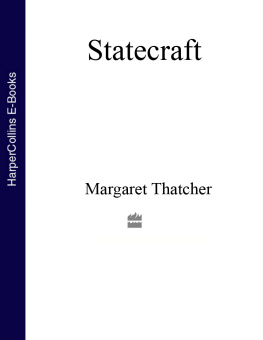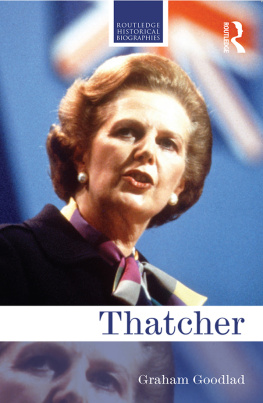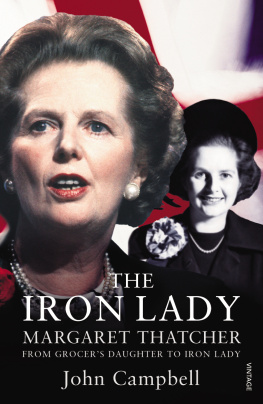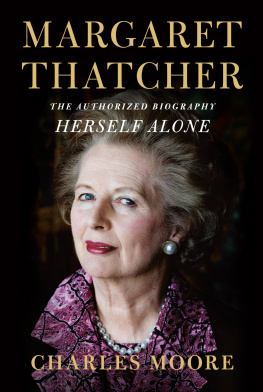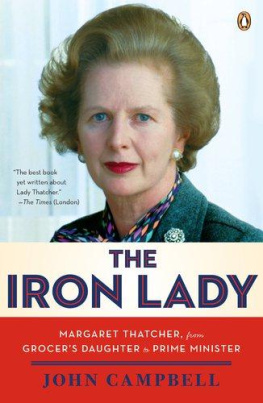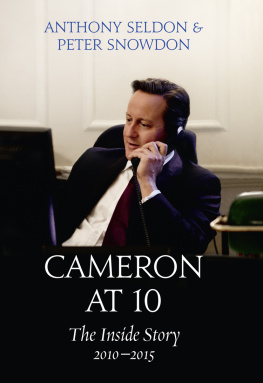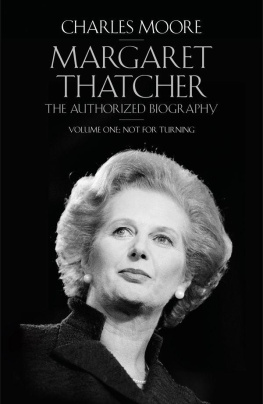M ARGARET , T HE L ADY T HATCHER. O.M., P.C., F.R.S.
H OUSE OF L ORDS
L ONDON SW1A 0PW

Ayes, 311. Noes, 310. Even before the figures were announced by the tellers, we on the Opposition benches knew that Jim Callaghans Labour Government had lost its motion of confidence and would have to call a general election. When the four tellers return to read the total of votes recorded in the lobbies, MPs can see which party has won from the positions they take up facing the Speaker. On this occasion the two Tories walked towards the Speakers left hand in the space usually occupied by government whips. A great burst of cheering and laughter rose from the Tory benches, and our supporters in the spectators galleries roared with out-of-order jubilation. Denis, who was watching the result from the Opposition box on the floor of the House, shouted hooray and was, quite properly, reproved by one of the Serjeants at arms. Through the din, however, the stentorian guards officer tones of Spenser Le Marchant, the 6 6 Tory MP for High Peak who was famous for his intake of champagne, could be heard booming out the result the first such defeat for a British Government in more than fifty years.
We had known the figures would be close, but we had not known how close as we filed in and out of the lobbies. I looked for the unexpected faces who might decide the outcome. Labour whips had been assiduously rounding up the handful of independent MPs whose votes might put them over the top. In the end everything turned on the decision of one elusive Irish MP, Frank Maguire, who did indeed arrive at the Palace of Westminster, lifting the hopes of Labour ministers. The wait before the announcement was filled with rumour and counter-rumour across the Chamber. It seemed endless. Our Chief Whip quietly gave me his own forecast. I said nothing and tried to look inscrutable, doubtless without success. Some on the Labour benches, hearing of Mr Maguires appearance, began to grin in anticipation of victory. But Mr Maguire had arrived only to abstain. And on 28 March 1979, James Callaghans Labour Government, the last Labour Government and perhaps the last ever, fell from office.
The obsequies across the despatch box were brief and almost formal. Mr Callaghan told the House that he would take his case to the country and that Parliament would be dissolved once essential business had been transacted. Replying for the Opposition, I said that we would co-operate in this to ensure a dissolution of Parliament at the earliest opportunity. A slight sense of anti-climax after all the excitement took hold of MPs. On all sides we felt that the Commons was for the moment no longer the centre of events. The great questions of power and principle would be decided elsewhere. I got up to leave the Chamber for a meeting of the Shadow Cabinet in my Commons room, and Willie Whitelaw, who could often sense my mood even before I realized it myself, put an encouraging arm around my shoulder.
The Shadow Cabinet meeting was brisk and businesslike. Our main concern was to prevent the Labour Government from scoring any parliamentary runs in the limited time left to it. In particular, we were strongly of the view that there should be no budget statement, whatever limited tax changes might be needed to keep public finance on an even keel. We resolved that in office we would honour the Labour Governments pledge to increase pensions by the amounts which the Prime Minister had announced in the confidence debate. And we decided to press for an election on 26 April, the earliest possible date, knowing that Labour would wish to stretch out the timetable in the hope of restoring their party morale. (In the end we had to settle for 3 May.) Then, the business concluded, we had a celebratory drink and broke up.
Driving back to my home in Flood Street, Chelsea, with Denis, I reflected on the coming battle. We had a fight on our hands, of course; but barring accidents it was a fight we should be able to win. The Governments defeat in the confidence debate symbolized a larger defeat for the Left. It had lost the publics confidence as well as Parliaments. The winter of discontent, the ideological divisions in the Government, its inability to control its allies in the trade union movement, an impalpable sense that socialists everywhere had run out of steam and ideas all these gave a fin de sicle atmosphere to the approaching election campaign.
The Tory Party, by contrast, had used its period in Opposition to elaborate a new approach to reviving the British economy and nation. Not only had we worked out a full programme for government; we had also taken apprenticeships in advertising and learnt how to put a complex and sophisticated case in direct, clear and simple language. We had, finally, been arguing that case for the best part of four years, so our agenda would, with luck, strike people as familiar common sense rather than as a wild radical project. On all these scores I felt a reasonable confidence.
The prospects after an election victory were another matter. Britain in 1979 was a nation that had had the stuffing knocked out of it with progressively more severe belabourings over the previous hundred years. Beginning in the 1880s, our industrial supremacy had been steadily eroding in the face of first American, then German competition. To be sure, some part of this erosion was inevitable and even welcome. As the pioneer of the industrial revolution, Britain enjoyed a head start over its competitors that was bound to diminish as nations with larger populations and more abundant natural resources entered the race. But since their rise would mean the growth of large export markets for Britain as well as fierce competition in domestic and third markets Imperial Germany, for instance, was Britains second largest export market in 1914 this commercial rivalry was more blessing than curse.
What made it in the event more curse than blessing was Britains failure to respond to the challenge effectively. We invested less; we educated and trained our people to a lower standard; and we allowed our workers and manufacturers to combine in various cartels that restricted competition and reduced efficiency. Thoughtful observers had noticed these trends by the beginning of this century. Arthur Balfours Tory administration of 19025 reformed education, training and scientific research in response to a non-partisan public agitation that has come to be called the quest for national efficiency. But such attempts to revive Britains economy by social reform were battling against very profound social forces: the natural complacency of a nation grown used for more than a hundred years to top dog status; the economic cushion provided by Britains vast overseas investments (equal in 1914 to 186 per cent of GNP); the deceptive might of an empire which continued to expand until 1919 but which cost more to defend than it contributed to national wealth; and, of course, the exhausting national losses of the First and Second World Wars. As a result, the Britain that woke up on the morning after 1945 was not only a nation drained by two great military efforts in defence of common civilization, but also one suffering from a prolonged bout of economic and financial anaemia.


